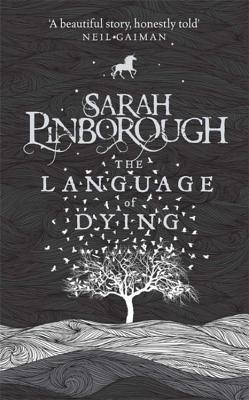 The Language of Dying by Sarah Pinborough
The Language of Dying by Sarah Pinborough Published by Jo Fletcher Books on August 2 2016
Genres: Fantasy
Pages: 144
Our reviews of this author: 13 Minutes
Format: ARC
Source: Publisher





This is my first Sarah Pinborough book, and ironically it’s not the type of story she usually writes. But it demonstrates just how good a writer she is, so no matter what the subject matter, I know I’ll be picking up her other books in the future. The Language of Dying is a short novella, but within these pages is a very powerful story about loss in all its many forms. I knew going into it that it was about a woman caring for her dying father, but this story turned out to be about so much more.
The narrator, an unnamed woman who is about to turn forty, cares for her father who has been living with her for the past year, slowly dying of cancer. The story focuses on his last days, as his doctors have told her the end is near. She reluctantly contacts her four siblings and asks them to visit, and as they arrive one by one, we get to know the fraught and volatile family relationships among this group of brothers and sisters. Peter, the eldest, has led a life of womanizing and has had many ups and downs in his high-powered career. Elder sister Penny is the most successful of the bunch, a nurturing mother who can always diffuse the tension in the room and is the most supportive of all the siblings. Young twins Simon and Davey are drug addicts and can barely function, let alone give moral support to their sister.
As they gather together for the last time as a family, the narrator reflects back on her tempestuous life and tries to come to terms with the impending death of her father. And just outside the bedroom window on a country road, a beast who may or may not be real waits for her.
Above all, The Language of Dying is a truthful story. Pinborough takes everything good and bad about being in a family and shines a glaring light on it. I’m sure every reader will see glimpses of their own families and personal relationships in this story: the sister that you love but are insanely jealous of; the brother that took the wrong path in life and there is absolutely nothing you can do to help him; and the echo of a long-departed mother who could have fixed everything if only she hadn’t left her family. And of course, the dying parent who, without meaning to, brings all these people together.
And yes, the descriptions of the terminally ill father are sad and tough to read. During the story, various nurses and home-care professionals visit his bedside and impart medical information to the family with an utter lack of emotion. Anyone who has been through something like this is bound to have an intense emotional reaction to everything that’s happening. Pinborough keeps her tone matter-of-fact when describing the unpleasantness of death, and yet the reader is still emotionally moved.
But far more gut-wrenching to me was the discovery of the narrator’s horrific past and how it’s shaped her into the woman she is now, contemplating life and death at her father’s bedside. She remembers her past in flashbacks that are scattered throughout the story, which give us just enough information to form a picture of a tragic life that could have been avoided. These two elements, the father dying and the narrator’s revelations, made this an emotional and deeply felt story that will stay with me for a long time.
Pinborough’s prose is simple and lovely. She’s the type of writer that doesn’t need lots of words to convey emotion. Despite the small page count, The Language of Dying feels bigger than it is. It’s the rare story that touches on so many topics and does each of them justice, and yet it’s just the right length to convey everything necessary.
There is a magical realism element to the story that gives it a mysterious, otherworldly quality, and as with most magic realism, it leaves the reader wondering whether or not that magic is real. It was just enough for me to classify this as speculative fiction, but honestly, Pinborough could have left those elements out and it still would have been a powerful reading experience.
The ending threw me a bit, and it’s probably the reason I didn’t rate this book higher. Without spoiling it for you, I’ll simply say that it was completely unexpected in every way, and that some readers will like it and some won’t. I’m not sure how I feel about it, other than to say that after some reflection, I think it was the best way to end the story. But was it a satisfying ending? I guess for me it wasn’t, but the fact that I’m still thinking about it, days after finishing this book, makes me think the author did it for a good reason.
You can easily read this story in an hour or two, but I guarantee the emotional resonance will linger long after.
- Review: Waking Gods by Sylvain Neuvel - April 11, 2017
- Review: Kings of the Wyld by Nicholas Eames - March 28, 2017
- Review: Star’s End by Cassandra Rose Clarke - March 14, 2017


No Comments
Comments are closed.